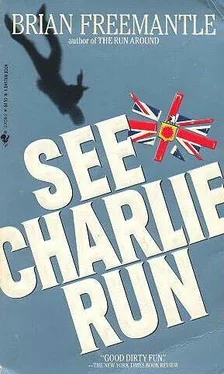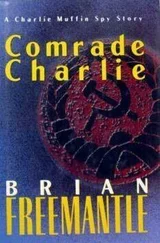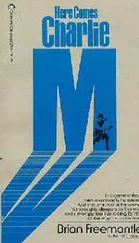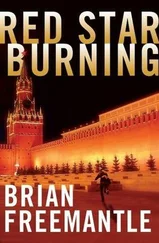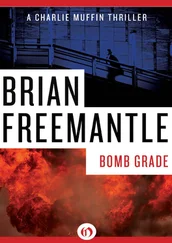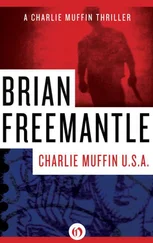Brian Freemantle - See Charlie Run
Здесь есть возможность читать онлайн «Brian Freemantle - See Charlie Run» весь текст электронной книги совершенно бесплатно (целиком полную версию без сокращений). В некоторых случаях можно слушать аудио, скачать через торрент в формате fb2 и присутствует краткое содержание. Жанр: Шпионский детектив, на английском языке. Описание произведения, (предисловие) а так же отзывы посетителей доступны на портале библиотеки ЛибКат.
- Название:See Charlie Run
- Автор:
- Жанр:
- Год:неизвестен
- ISBN:нет данных
- Рейтинг книги:4 / 5. Голосов: 1
-
Избранное:Добавить в избранное
- Отзывы:
-
Ваша оценка:
- 80
- 1
- 2
- 3
- 4
- 5
See Charlie Run: краткое содержание, описание и аннотация
Предлагаем к чтению аннотацию, описание, краткое содержание или предисловие (зависит от того, что написал сам автор книги «See Charlie Run»). Если вы не нашли необходимую информацию о книге — напишите в комментариях, мы постараемся отыскать её.
See Charlie Run — читать онлайн бесплатно полную книгу (весь текст) целиком
Ниже представлен текст книги, разбитый по страницам. Система сохранения места последней прочитанной страницы, позволяет с удобством читать онлайн бесплатно книгу «See Charlie Run», без необходимости каждый раз заново искать на чём Вы остановились. Поставьте закладку, и сможете в любой момент перейти на страницу, на которой закончили чтение.
Интервал:
Закладка:
‘Everything’s fine,’ said the man, whose apartment was in Wanchai, off the road leading to the Happy Valley racecourse. As Lu spoke, Fredericks, Levine and Fish were arriving outside, spreading out at once to establish a triangular surveillance pattern.
And in her seaview room at the Macao Hyatt, five floors above where the two men sat, Irena Kozlov replaced the receiver after the conversation with her husband in the Tokyo apartment, warmed by the contact. It was wonderful, after the difficulties they’d had, to know that he loved her so much now: so determined to protect her against any trickery that he’d refused to go across to the Americans until she was beyond the risk of any interception. She smiled, remembering the assurance; relax, you’re safe, he’d said.
‘Darling Yuri,’ she said, aloud. ‘Darling Yuri.’
Chapter Twenty-Two
To inculcate a mentality which enables a sane person to kill, in dispassionate cold blood, requires a prolonged period of specialized psychological indoctrination: indeed the KGB relegate the practical instruction, the unarmed combat and weapon handling expertise and knowledge of debilitating drugs and poisons, to the very end of any training course. And without it being considered in any way an absurd contradiction, that indoctrination makes a case for the moral acceptability of the act in dictated circumstances while supporting the forbidden criminality of wanton, needless murder.
The Russian instruction — refined and perfected since the maniacal, mass slaughter days of Stalin and of people like Genrikh Yagoda, a trained pharmacist who once ran the forerunner to the KGB and enjoyed experimenting upon prisoners in Lubyanka — is regarded as the best by other intelligence agencies, all of which employ assassins.
A predominant reason making it superior to others is that Soviet psychologists are able fully to capitalize upon an attitude inherent and peculiar to Russians: a practically mystical love of country. The persistent theme throughout the lectures and debates, therefore, is that there is a positive duty to eliminate enemies of the state: to kill, for one’s country, is justified. It makes murder logical. Usually.
Olga Balan was a dedicated party member, an absolutely committed and loyal officer of the KGB but someone unable, no matter how hard she tried — and she tried very hard, spurred by that dedication and commitment — to forget her parents’ adherence to the Russian Orthodox faith and its inherited affect upon her. When she entered the service, she worried the stigma of their belief would militate against her: maybe even prevent her being accepted in the first place. That it didn’t only indicated an oversight in the background checks Olga knew were always carried out, and for a long time after her enlistment she lived in constant apprehension of the damaging fact emerging, to destroy her. Over the years that fear diminished, but the memories of the childhood church visits and the before-meal prayers and the learned-by-rote scriptures would not go away. Now those recollections stayed as an irritation, a dull but nevertheless nagging problem, like an aching tooth no dentistry could relieve. As someone who embraced communism completely she had no religion, of course. And had succeeded, as her KGB career progressed, in subjugating the dichotomy in almost everything. The exception was to kill.
Olga underwent her psychological indoctrination at a complex known as Balashikha, east of the Moscow ring road, just off Gofkosvkoye Schosse. At first there was positive revulsion — an absolute rejection of the justification thesis — so much so she expected her dismissal from the course, which would have meant her automatic ejection from the service. But then the escape occurred to her. Olga realized she was being trained in theory, not actual practice, for entry into the ultimately secret Department 8 of Directorate S of the First Chief Directorate: she could pretend.
She easily and unworriedly passed the assessments and the later, practical training with commendations, and upon her reference file in Dzerzhinsky Square she was listed as someone able — and capable — of killing. But only in theory. Until now: now it was no longer pretence. Now it was real: frighteningly real.
That very psychological indoctrination compounded her difficulty beyond any childhood religious prohibitions. Enemy of the State was always the requirement for the necessary justification. Was Irena Kozlov that? By defecting, she was, according to strict definition, but Olga could not accept the easy way out. Irena Kozlov had been tricked into crossing: so the formula didn’t fit.
Olga sat hunched at an outside table of the hotel at the beginning of the bridge, on the Macao side, the long-forgotten coffee cold in front of her, her mind suddenly blocked by the reflection, confronting at last something that she had been avoiding for too long.
Why didn’t Yuri suffer any agonized guilt?
Olga supposed that for his specialized department Yuri’s indoctrination had been much more exhaustive than hers but she knew one thing — the basic justification — remained the same. Which meant Yuri was calculatingly — dear God, how calculating! — prepared to murder, without any excuse. Her reasoning became jumbled, trying to hold different thoughts at the same time, irritated at mentally invoking a god in whom she didn’t believe and at the uncertainty she suddenly felt, facing up at last to the numbing callousness in someone she loved so much. Did she have the right, to think like this? Hadn’t she known — but refused to recognize — all along that Irena Kozlov was being manipulated towards her own murder? Of course she had. ‘You know I’ll do anything you want .’ Her own words — the long-ago undertaking after a night of lovemaking when he’d first proposed the idea — echoed in her mind, as if she could actually hear herself saying them. She’d known then what it meant and she’d conducted the entrapment interviews knowing what it meant. The only change to all the unobjected planning was that until twenty-four hours earlier it was going to be Yuri and not herself who carried out the act. So she was as culpable and as callous as he was: worse than him, even, someone prepared to be involved in murder providing it wasn’t her who had to pull the trigger or detonate the bomb.
Olga squeezed her eyes tightly against the tears of complete honesty, worried at attracting attention from the few people about her. She had to do it! She had to stop hiding behind mixed-up thoughts about a half-forgotten religion she didn’t profess and mixed-up thoughts about a morality she didn’t have: to seek out Irena Kozlov in the hotel she could clearly see across the other side of the river and pull the trigger of the special plastic assassin weapon that did not show up on airport security monitors, the Technical Division’s invention that employed compressed air to fire the killing, poison impregnated plastic bullets. Dear God — damn the readiness of the plea! — how much she hoped she could do it!
Calling upon the theory so well taught at Balashikha, Olga decided it wasn’t going to be easy, irrespective of her personal anxieties. From where she sat, the hotel appeared to dominate the far side of the bridge: anything or anyone crossing it would be fully visible all the time, like someone going over a drawbridge to a medieval castle. And Olga reckoned from the antipathy existing between them in Tokyo that Irena Kozlov was probably more likely to identify her than any other member of the Soviet embassy.
Which was only one of the difficulties. The Englishman, Charlie Muffin, had already proved his cleverness in getting Irena safely away from Japan. Professional, Yuri called the man, in reluctant admiration. Definitely someone who couldn’t be underestimated. And what back-up did the man have?
Читать дальшеИнтервал:
Закладка:
Похожие книги на «See Charlie Run»
Представляем Вашему вниманию похожие книги на «See Charlie Run» списком для выбора. Мы отобрали схожую по названию и смыслу литературу в надежде предоставить читателям больше вариантов отыскать новые, интересные, ещё непрочитанные произведения.
Обсуждение, отзывы о книге «See Charlie Run» и просто собственные мнения читателей. Оставьте ваши комментарии, напишите, что Вы думаете о произведении, его смысле или главных героях. Укажите что конкретно понравилось, а что нет, и почему Вы так считаете.
